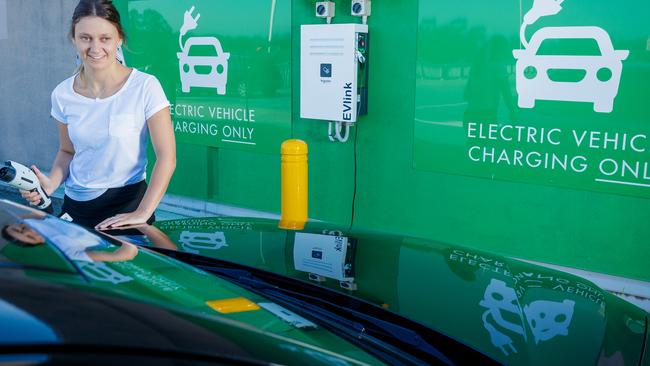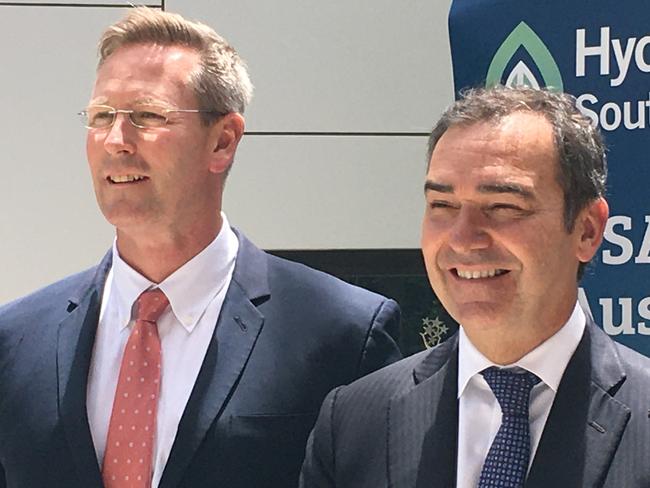SA electric vehicle action plan puts government fleet, taxis, ride share and cops in driver’s seat
The government has revealed a statewide charger network in its plan to make taxi, Uber, bus and business fleets all-electric. See the map.

SA News
Don't miss out on the headlines from SA News. Followed categories will be added to My News.
The State Government will pump its $80m a year of spending on cars to drive the electric vehicle market.
Under a new “lead-by-example” policy, public servants would get an EV unless they could prove it would not be adequate for their job.
The move is among a raft of initiatives pledged in an Electric Vehicle Action Plan launched on Saturday.
In addition, taxis and ride-share services such as Uber, city buses and business car fleets will be channelled into being all electric.
Police will drive Hyundai electric vehicles and all households will save hundreds of dollars off their electricity bills, whether or not they own an EV.
“We want all new passenger vehicles sold in SA to be fully electric by 2035,” Premier Steven Marshall and Energy and Mining Minister Dan van Holst Pellekaan said in a joint statement.
EVs will “deliver the biggest step change in transport since Henry Ford mass-produced the Model-T”, they said.
The plan aims to “replace polluting fuels with local, clean power” and build on SA’s global leadership in solar and battery usage.

The plan does not back away from a move to introduce a road user charge for EVs, as announced last month in the State Budget.
The tax, which has been strongly criticised by EV groups and will be opposed in Parliament by the ALP, is intended to help fund roadworks by replacing the fuel excise now paid to the Federal Government.
“Transport and land planning will identify how our roads and built environment will need to adapt to the differing needs of EVs,” Mr Marshall and Mr van Holst Pellekaan said.
“This includes the development of roadside and home charging infrastructure.”
The cost of a road-user charge has not been announced. However, currently if a motorist travels the average 12,000km a year in a vehicle with 10.8 litres/100km fuel efficiency they are paying about $550/year in excise.
In total, SA pays $500m to $700m/year in excise.
Providing and fuelling petrol and diesel vehicles for public servants already costs about $80m a year.
Repurposing the spending into EVs would cost the same in terms of distance travelled but kickstart a second-hand EV market for the public because government usually turns over car leases quickly.
This would grow further with business, local government, taxi companies encouraged to transition their fleets.
The Government has allocated $18.3m to initiatives in the plan, including a previously announced $13.4m to facilitate a statewide charging network.
Alongside the plan, a prospectus invites commercial property owners and tenants to register interest by February 15 next year in having fast chargers installed in partnership with a charging business.
A competitive grants process would then allocate funds.
Property owners may end up getting the charger for no cost and reap benefits of attracting more customers who would stay longer, the prospectus says.
A map of preferred locations has been published in the prospectus.
The EV plan complements the 2021-25 climate plan published this week which identified emissions from transport as causing 29 per cent of the state’s greenhouse gas emissions.
The climate policy anticipates continuing rapid growth in SA’s renewable energy generation – such that by 2050 SA produces five times what it uses, becoming a major energy exporter.
The EV plan says that if there is a high uptake of the vehicles and a smart system so they are charged at times of the day when there is excess energy in the electricity grid the improved efficiency will see power bills for an average household cut by $324 a year by 2030.
Originally published as SA electric vehicle action plan puts government fleet, taxis, ride share and cops in driver’s seat




